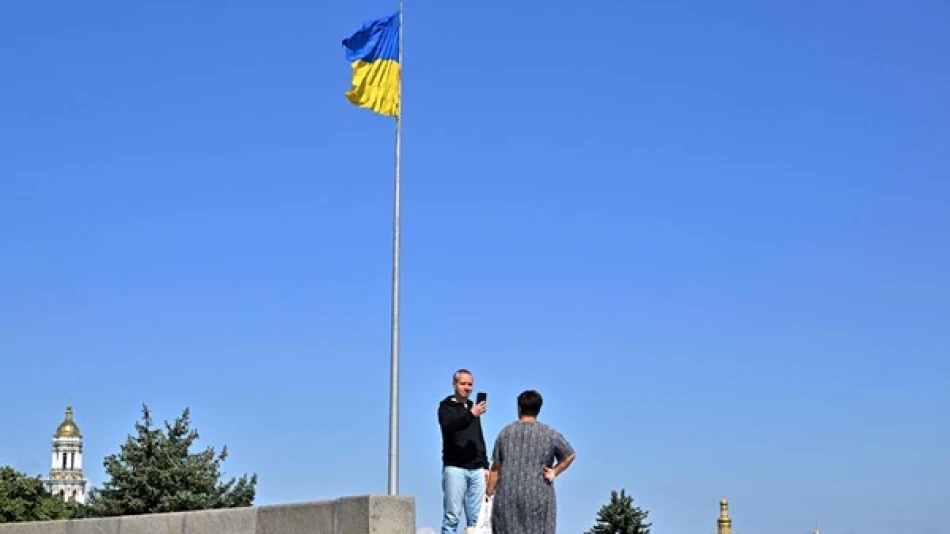
Ukraine Celebrates National Flag Day with Patriotic Fervor
Ukraine Marks Flag Day Amid Ongoing War as Russia Claims Territorial Gains
As Ukraine celebrated National Flag Day on Saturday with President Volodymyr Zelensky attending ceremonies in Kyiv, the symbolic moment highlighted the nation's resilience amid a grinding conflict that has now stretched beyond three and a half years. The celebration comes just one day before Ukraine's Independence Day, marking 34 years since breaking away from the Soviet Union, while Russian forces reportedly continue advancing in eastern territories.
Zelensky's Message of Hope and Liberation
Speaking on social media platform X, President Zelensky emphasized the profound meaning behind Ukraine's blue and yellow flag for those returning from captivity. "This flag represents a sense of freedom for those we bring back from captivity. When they see the Ukrainian colors, they realize that evil has ended," Zelensky stated during the Flag Day ceremonies.
The president's remarks underscore the psychological warfare aspect of the conflict, where national symbols have taken on heightened significance. For Ukrainians living in occupied territories or those who have been prisoners of war, the flag serves as more than patriotic imagery—it represents tangible hope for liberation and return to Ukrainian sovereignty.
Timing Amplifies Symbolic Weight
The Flag Day celebration gains particular resonance given its proximity to Ukraine's Independence Day on Sunday, which commemorates the country's 1991 departure from the Soviet Union. This historical parallel is not lost on observers, as Ukraine once again finds itself fighting to maintain independence from Russian influence—this time through military rather than political means.
The timing also marks a sobering milestone: three and a half years since Russia's full-scale invasion began in February 2022. What many initially expected to be a swift conflict has evolved into a prolonged war of attrition that has reshaped European security architecture and global geopolitical alignments.
Military Reality Contrasts with Ceremonial Optimism
While Ukrainian leadership projected confidence during Flag Day ceremonies, military developments on the ground present a more complex picture. Russia's Defense Ministry reported that its forces continue advancing in eastern Ukraine, claiming control over two villages in the Donetsk region.
This reported progress aligns with recent patterns where Russian forces have made incremental gains in eastern territories, particularly in Donetsk and Luhansk regions. However, these advances come at significant cost and represent relatively modest territorial changes compared to the early months of the conflict.
Strategic Implications for International Support
The juxtaposition of ceremonial celebration with ongoing military pressure highlights Ukraine's delicate position as it seeks to maintain international support while acknowledging battlefield realities. Flag Day serves as a diplomatic tool, reminding global audiences of Ukraine's national identity and sovereignty claims even as territorial control remains contested.
For international observers and policymakers, these symbolic moments provide opportunities to reaffirm support commitments. The approaching Independence Day likely will see renewed pledges of military and economic assistance from Western allies, particularly as the conflict approaches what many consider a critical juncture heading into another winter of warfare.
Looking Beyond Symbolism
While national celebrations provide important morale boosts for Ukrainian civilians and military personnel, the practical challenges remain formidable. The country faces ongoing infrastructure attacks, economic pressures, and the complex task of maintaining public support for a prolonged conflict with no clear endpoint in sight.
The emphasis on prisoner exchanges and liberation themes in Zelensky's Flag Day message suggests Ukraine continues prioritizing humanitarian aspects of the conflict alongside military objectives. This approach serves both domestic political needs and international diplomatic goals, positioning Ukraine as fighting for fundamental human rights rather than merely territorial control.
Most Viewed News

 Layla Al Mansoori
Layla Al Mansoori






